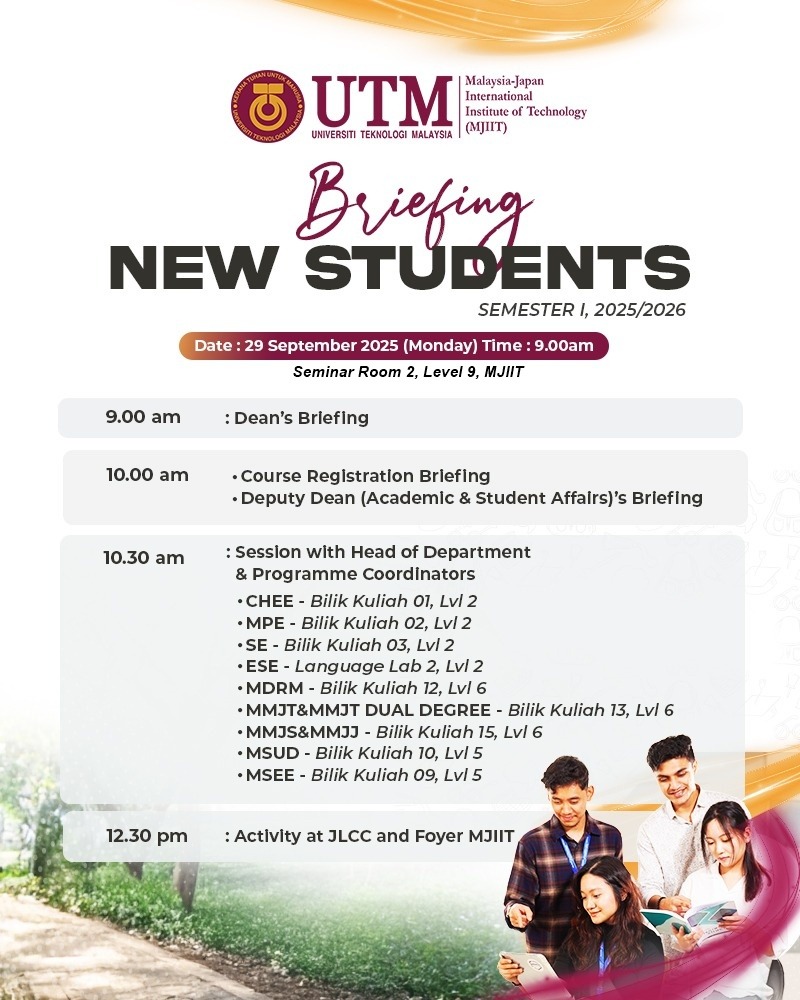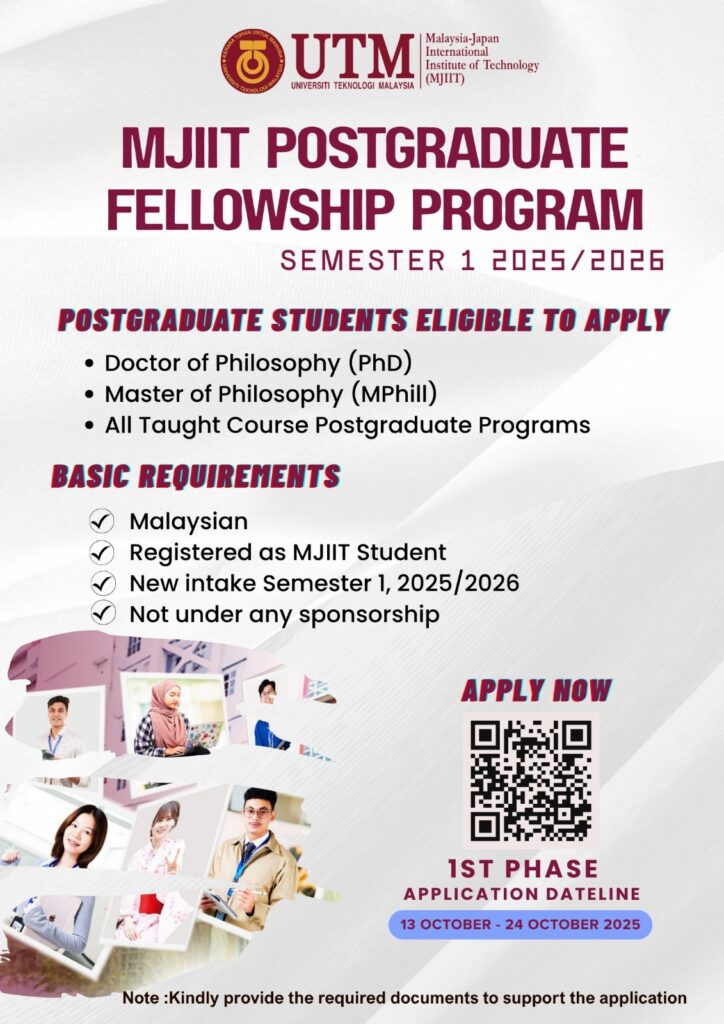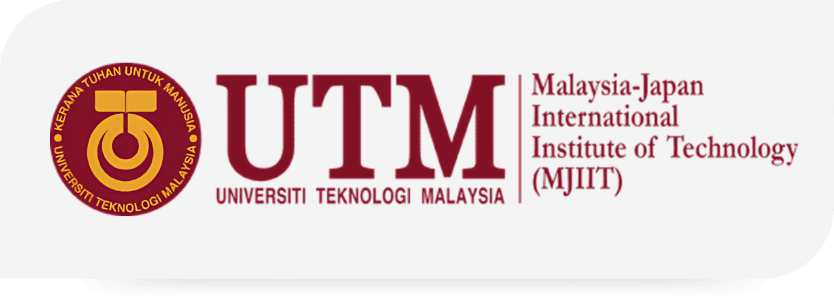Malaysia-Japan International Institute Technology (MJIIT)
Postgraduate
At MJIIT, we offer innovative postgraduate programs that merge Japanese and Malaysian philosophies, equipping you for global challenges through advanced skills and meaningful collaboration.
Doctor of Philosophy (Engineering Education) – PMJEA3AKA
Overview
The PhD in Engineering Education is a reesarch-intensive program designed to provide candidates with the fundamental principles of engineering education, effective research design strategies, and insights into the current trends and needs in the engineering education field. Candidates are strongly encouraged to complete pre-requisite courses to equip them with the foundational knowledge necessary for advanced research.
The program is ideal for those aspiring to roles in academia, industry, consulting and government agencies. The program is also suitable for engineering education researchers, educational training specialists, technical communication experts, or those holding leadership positions such as directors of teaching or learning centers, diversity programs, or outreach initiatives, as the program provides the knowledge and skills required in the field.
Core Courses:
- Research Methodology in Engineering Education’
- Elective Course
Area of Research (but not limited to)
- Engineering Epistemologies
- Engineering Learning Mechanism
- Engineering Learning Systems
- Engineering Diversity & Inclusiveness
- Engineering Assessment
- Engineering Education for Sustainable Development
- STEM Education Research
Programme Duration
Programe Fees:
- Local - RM 18,350
- International - RM 48,600
Entry Requirements
Academic/Experience
- A Master’s Degree from Universiti Teknologi Malaysia or any other institutions of higher learning recognized by the Senate; or
- Other qualifications equivalent to a Master’s Degree and experience in the relevant field recognised by the Senate; an
- A Bachelor's Degree in engineering or related field from institution of higher learning recognized by the UTM Senate ; or
- Other qualifications equivalent to a Bachelor’s degree in relevant field recognized by the Senate and a minimum of three (3) years of experience in teaching, studying, or conducting research in engineering education.
- Fundamentals of Engineering Education
- Data Analysis Techniques
- Issues in Engineering Education
English
Doctor of Philosophy (PhD) – PMJGA3AKA
Description
Doctor of Philosophy (PhD) is a research-only qualification designed for students who intend to pursue an academic or research career. The degree is awarded on the basis of the submission of a thesis which should give evidence of the candidate’s ability to carry out research, evidence that candidate has shown originality and independence, and that the candidate has made a significant contribution to knowledge in particular field.
Area of Research (but not limited to)
Electronic System and Mechanical Engineering:
- Advanced devices and materials engineering
- Artificial intelligence and robotics
- Biology inspired system & technology
- Communication system & network embedded system
- Intelligent dynamic system
- Photonics engineering
- Structural and control processing
- Tribology and precision machining
- Vehicle system engineering
Environmental Engineering
- Ecological engineering
- Air resources engineering
- Water and solid waste engineering
- Wind and thermal engineering
- Disaster management
Biological Engineering
- Biologically inspired system and technology
- Algae biomass
- Metabolic engineering and molecular biology
- Bioprocess engineering and biosensor
Innovation, Technology Management & Business
- Intelectual property and innovation
- Technology management
- Financial technology
- Human resource concept
- Policy development related to innovation and technology
- IR 4.0 & 5.0
Chemical and Material Engineering
- Chemical energy conversion
- Fuel cell and battery
- Process control and safety
- Process design
- Biopolymer & nanomaterial
Programme Duration
Programe Fees:
- Local - RM 18,350
- International - RM 51,600
Entry Requirements
Academic/Experience
- A Master’s Degree from Universiti Teknologi Malaysia or any other Institutions of higher learning recognised by the Senate; or
- Other qualifications equivalent to a Master’s degree and experience in the relevant field recognised by the Senate; or
- Candidates who a currently registered in a Master’s Degree programme at Universiti Teknologi Malaysia, and approved by the Graduate Studies Committee of the respective faculty and the Senate.
English
Master of Philosophy (MPhil) – MMJGA3AKA
Description
This Master by research is supervised by a graduate faculty (or a panel of graduate faculty members). The directed research work introduces candidates to the processes by which new knowledge is developed and applied accordingly.
Area of Research (but not limited to)
- Advanced devices and materials engineering
- Artificial intelligence and robotics
- Biology inspired system & technology
- Communication system & network embedded system
- Intelligent dynamic system
- Photonics engineering
- Structural and control processing
- Tribology and precision machining
- Vehicle system engineering
- Ecological engineering
- Air resources engineering
- Water and solid waste engineering
- Wind and thermal engineering
- Disaster management
- Biologically inspired system and technology
- Algae biomass
- Metabolic engineering and molecular biology
- Bioprocess engineering and biosensor
- Intelectual property and innovation
- Technology management
- Financial technology
- Human resource concept
- Policy development related to innovation and technology
- IR 4.0 & 5.0
- Chemical energy conversion
- Fuel cell and battery
- Process control and safety
- Process design
- Biopolymer & nanomaterial
Programme Duration
Programe Fees:
- Local - RM 9,560
- International - RM 28,400
Entry Requirements
Academic/Experience
English
Doctor of Professional Practice (ODL)
(Mixed mode / Open and Distance Learning)
The Doctor of Professional Practice program, the first of its kind in Malaysia, is a collaborative effort by eight engineering, science, and technology faculties of UTM. It offers a balanced blend of taught coursework and research activities. Candidates will engage in eight cutting-edge courses and complete a capstone project, enabling professionals to apply their extensive practical experience to doctoral-level research.
In this program, your professional expertise takes center stage. Through the capstone project, candidates harness their practical knowledge to conduct advanced research. The focus lies on developing innovative solutions to real-world challenges within your field. Structured into six stages, the capstone project guides candidates through problem identification to project endorsement, with clear milestones to measure progress.
Candidates have the flexibility to choose both university and industry supervisors, benefiting from their mentorship and experience. Our program offers a self-paced, 100% online delivery format. Additionally, our fee structure is flexible, based on the number of credits enrolled, allowing you to tailor your financial commitment according to your needs.
Subjects
Programme Total Credit
Programme Duration
Programe Fees:
- Local - RM 55,090 - RM 69,790
- International -RM 71,490 - RM 86,190
Entry Requirements
Academic/Experience
- A master’s degree from Universiti Teknologi Malaysia or any other Institutions of higher learning recognised by the Senate; or
- Other qualifications equivalent to a master’s degree and experience in the relevant field recognised by the Senate; or
- Candidates who a currently registered in a master’s degree programme at Universiti Teknologi Malaysia and approved by the Graduate Studies Committee of the respective faculty and the Senate.
- Minimum 3 years working experience in related field
- ADMISSION THROUGH APEL (FOR MALAYSIAN CANDIDATES ONLY)
- Malaysian citizens with an APEL.A T8 certificate can be considered for admission (subject to faculty approval). Visit https://apel.utm.my/ for more information about APEL certificate.
English
Master in Disaster Risk Management
The MDRM programme concept lies in the balance and links among “Education/Training – Research – Practice.”, attempts to develop Disaster Risk Management (DRM) professionals with these set of skills, and utilizes its strong partnership with DRM-related agencies, NGOs and local governments. MDRM students will be a part of our network of DRM professionals consisting of people from various countries and backgrounds.
Minimum requirements: A Bachelor’s Degree with good honours from Universiti Teknologi Malaysia or any other institutions of higher learning recognised by the Senate (UK NARIC), And CPA 2.5 or above, Or 2.0 ≦ CPA ≦ 2.49 with 5 years working experiences.
Subjects
Programme Total Credit
Programme Duration
Programe Fees:
Entry Requirements
Academic/Experience
English
Master in Sustainable Systems
The academic curriculum of the programme is accredited by Malaysia Qualification Agencies which recognized by the Government of Malaysia.
This programme provides students with the latest developments, knowledge and applications of sustainable systems.
The programme’s strength lies in its multidisciplinary, arming students with the right tools to address the complex sustainability.
Subjects
- Applied Sustainable Systems
- Life Cycle Assessment
- Green Economy
- Industrial Ecology and Cleaner Production
- Sustainability Management & Policy
- Research Methodology
- Master Project 1
- Master Project 2
- Elective Courses
Programme Total Credit
Programme Duration
Programe Fees:
- Local - RM 18,670
- International - RM 28,500
Entry Requirements
Academic/Experience
- Bachelor Degree in Science, Technology or Engineering or related field with minimum CGPA of 2.5/4.00 from institutions of higher learning recognized by the UTM senate (UK NARIC).
- For other degree than those mentioned above or CGPA of less than 2.5/4.0, minimum working experience of five years in the related field is required.
- Specific and details requirements based on programme, refer to https://admission.utm.my
English
Master in Technology and Innovation Management
Overview
This programme is designed for executives and managers who are looking to develop their business acumen and leadership skills for advancement to more senior positions. Specifically, the focus of this programme is to develop the necessary competencies needed to lead and manage in technology based situations. The curriculum for this programme is based on a leadership competency model that addressed these goals.
Details
Fees: RM 18,670 (Local) / RM 28,500 (International)
Minimum requirements: A Bachelor’s Degree with good honours from Universiti Teknologi Malaysia or any other institutions of any higher learning recognised by the Senate (UK NARIC), And CPA 2.5 or above, Or 2.0 ≦ CPA ≦ 2.49 with 5 years working experiences.
Subjects
Programme Total Credit
Programme Duration
Programe Fees:
Entry Requirements
Academic/Experience
English
Master in Technology and Innovation Management (Dual Degree with Yamaguchi University)
Subjects
Programme Total Credit
Programme Duration
Programe Fees:
Entry Requirements
Academic/Experience
English
Master of Science (Engineering Education)
Overview
The goal of this program is to provide opportunities for graduates with a Bachelor of Engineering, Bachelor of Engineering Technology, Bachelor of Science, Bachelor of Computer Science and Bachelor of Mathematics degrees to explore aspects of education in engineering. The program integrates the science of engineering education which includes educational philosophy, teaching and learning methods, and assessment and evaluation into the curriculum. Graduates will have the opportunity to practise in the field of engineering education as a;
1. Lecturer / Researcher
2. STEM Educator
3. Engineering Education consultant and trainer
4. Policy maker related to engineering education
5. Training center entrepreneurs
Graduates will be able to contribute in producing more dynamic, credible and holistic engineers who can help the nation to be more competitive. Through research in the field of engineering education, graduates will be able to improve the quality of the nation’s education system, as well as identify problems related to teaching and learning in the field of engineering education.
Details
Fees: RM 18,670 (Local) / RM 31,554 (International)
Minimum requirements:
Local Students
A Bachelor’s Degree in Engineering, or Science, or Computer Science, or Mathematics with good honours from Universiti Teknologi Malaysia or any other institution of higher learning recognised by the Senate; OR A qualification equivalent to a Bachelor’s Degree as per above area and experience in the relevant field recognised by the Senate.
International Students
Additional requirement for International Applicant an English Certificate of IELTS with the minimum band of 6.0 OR TOEFL with the minimum score of 550. Refer to https://admission.utm.my for UTM English requirement by country, qualification and list of country exempted from UTM English language requirement.
Subjects
Programme Total Credit
Programme Duration
Programe Fees:
Entry Requirements
Academic/Experience
English
Master of Science (Sustainable Urban Design)
Overview
Master of Science (Sustainable Urban Design) is an industrial-focused master-by-coursework program in Malaysia that addresses current local and global sustainable issues in the built environment. The program is an interdisciplinary program, crossing the field of architecture, urban planning, environmental planning, landscape architecture and environmental engineering. Master of Science (Sustainable Urban Design) assimilates the diverse areas of sustainable development and urban design by collaborating with the allied professionals as well as local and international university partners. An overseas study trip become a compulsory component to expose students to the global concern of sustainable development.
Master of Science (Sustainable Urban Design) offers evening class mode, both full-time and part-time modes, designed to provide philosophical, technical and scientific knowledge required in achieving innovative sustainable urban design. Apart from having in-house experts in urban design, the teaching staffs also include in house experts from related disciplines, experts and professionals in the industry who will bring the real-world issues relating to sustainable urban design into the class rooms. The multi-disciplinary nature of the program is designed to attract as many prospective students from various related disciplines.
Details
Fees: RM 15,886 (Local) / RM 26,769 (International)
Minimum requirements:
Bachelors
A Bachelor’s Degree in Architecture, Urban and Regional Planning, Landscape Architecture, or other related fields in the built environment and design with a minimum CGPA of 2.50, recognized by UTM.
OR
A Bachelor’s Degree in other fields with a minimum CGPA of 2.50 AND at least five (5) years of work experience in the built environment and design field. Specific and details requirements based on programmes, refer to https://admission.utm.my
English
International student need to meet specific English language requirements to study at Universiti Teknologi Malaysia. Refer to https://admission.utm.my for UTM English requirement by country, qualification and list of country exempted from UTM English language requirement.
Subjects
Programme Total Credit
Programme Duration
Programe Fees:
Entry Requirements
Academic/Experience
English
Master of Sustainability and Environmental Sciences (Joint Degree with University of Tsukuba)
This programme is the Joint Master’s Degree programme that develops experts who contribute to solve the complicated global issues, especially in tropical Asia by sustainable and environmental sciences, through the jointly supervised system that takes advantages of the strength of two universities, Malaysia-Japan International Institute of Technology (MJIIT), Universiti Teknologi Malaysia (1 year) and University of Tsukuba, Japan (1 year). Research will be conducted under joint supervision by the two universities. Graduated student will be awarded with degree from both universities.
Subjects
Programme Total Credit
Programme Duration
Programe Fees:
Entry Requirements
Academic/Experience
English
BRIEFING FOR NEW STUDENTS SEMESTER I, 2025/2026

Download Faculty’s Briefing Slide
Guideline For New Students RegistrationRegistration Guide |
Guideline for Course RegistrationClick Here |
Guideline Book2025/2026 (NEW) 2024/2025 |
Guideline for Credit TransferClick here |
Guideline for Graduate VerificationClick here |
Academic FormsClick here |
Academic RegulationsClick here |
Academic CalendarSemester I 2025/2026 |
Verification LetterClick here |
TimetableMMJR MMJL MMJJ MMJT MSEE MSUDMphilPhDPhD (EE) |
Work ScheduleClick here |
Programme CoordinatorsClick here |
|
|
Visa Matters
EMGS Update
Email : isckl@utm.my

POSTGRADUATE FELLOWSHIP PROGRAM (FIRST PHASE) APPLICATION FORM
Please note that:
1. Only Malaysian citizens are eligible to apply for full-time postgraduate programs at MJIIT.
2. Applicable to new students enrolled in postgraduate programs for Semester 1, 2025/2026 at MJIIT.
3. Applicant must not be receiving any sponsorship or be bound by any agreement with any other party besides MJIIT.
4. Applicant must provide all required documents; incomplete applications will not be considered.
Scholarship & Financial Aid: Click Here
Regulations: Click Here
